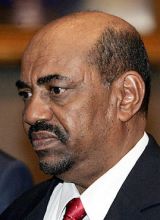Sudan’s Bashir resists pressure for Darfur UN force
Sept 14, 2006 (BANJUL) — Sudan President Omar Hassan al-Bashir on Thursday fended off intense international pressure for him to accept U.N. peacekeepers in Darfur, denouncing what he called a hidden agenda to “recolonise” his country.
 But some senior members of Sudan’s national unity government broke ranks and came out in favour of a U.N. mission in Darfur. They said African Union peacekeepers already on the ground were failing to halt the bloodshed in the conflict-torn region.
But some senior members of Sudan’s national unity government broke ranks and came out in favour of a U.N. mission in Darfur. They said African Union peacekeepers already on the ground were failing to halt the bloodshed in the conflict-torn region.
Western leaders, some African presidents, and humanitarian groups are piling pressure on Bashir to accept a U.N. resolution to deploy more than 20,000 U.N. peacekeeping troops in Darfur, which has been rent by political and ethnic violence since 2003.
They say this is the only way to avert a humanitarian catastrophe in the west Sudanese region, where tens of thousands of people have been killed and more than 2 million displaced by fighting between government troops, rebels and militias.
On Thursday, Bashir again reaffirmed his resistance to a U.N. peacekeeping force.
“The U.N. forces have a hidden agenda in Sudan because they are not coming for peace in Darfur. They want to recolonise Sudan,” Bashir said in Gambia after a brief visit.
“We are not ready to be … recolonised,” he added.
Bashir said the 7,000-strong AU peacekeeping force in Darfur had been successful and should continue, despite admissions by African leaders that it lacked resources and funding.
The AU mission expires on Sept. 30 and the U.N. Security Council last month passed a resolution for more than 20,000 U.N. peacekeeping troops to take over in Darfur.
“HUMANITARIAN GROUNDS”
Breaking ranks with Bashir’s line, Sudan’s most senior official on Darfur said he was not satisfied with what the AU was doing and would accept U.N. troops in the region.
Minni Arcua Minnawi, head of the former rebel Sudan Liberation Movement and now the fourth-ranking member of the presidency in Khartoum, said he was also worried about renewed fighting in North Darfur which has displaced tens of thousands.
“If there is no alternative, let the U.N. forces come,” he told Reuters and the BBC in a joint interview.
Minnawi was the leader of the SLM faction which signed a AU-brokered peace deal for Darfur in May. Two others refused and tens of thousands of Darfuris have demonstrated against it.
At Juba, in south Sudan, the country’s First Vice President, Salva Kiir, also criticised the strategy of the dominant National Congress Party (NCP), which opposes a U.N. force and maintains the Darfur crisis can be solved militarily.
“The U.N. has maintained there is a need for an international force to intervene … and we in the SPLM have consistently echoed this concern on humanitarian grounds,” Kiir, chairman of the Sudan People’s Liberation Movement (SPLM), said.
When Bashir stopped briefly in Dakar on Thursday, Senegalese President Abdoulaye Wade chided him for refusing to accept U.N. troops. “Africa’s position has been that we don’t have either the troops or money to fix Darfur’s problems,” Wade said.
He said African leaders would meet in New York on Monday to discuss the Darfur crisis.
Bashir rejected arguments that the AU lacked resources.
“The lack of resources is a pretext because, already last March in Khartoum, the Arab League summit agreed to fund the AU peacekeeping mission for six months,” he said in Banjul.
European Union foreign ministers will press the Sudanese government on Friday to halt attacks on civilians in Darfur, according to a draft EU statement obtained by Reuters.
And even China, a close ally of Sudan, has been lobbying Khartoum to let a U.N peacekeeping force into Darfur, Beijing’s U.N. ambassador said.
(Reuters)
